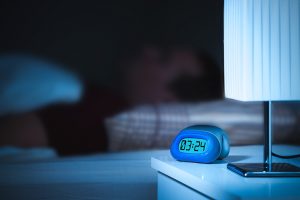Many of us would consider ourselves to be either an early bird or a night owl. A study involving more than half a million people has now found that being genetically programmed to be an early riser is linked with increased wellbeing and a lower risk of schizophrenia and depression. The genome-wide association analysis, headed by teams at the University of Exeter in the U.K., and at Massachusetts General Hospital, identified more than 300 new genetic loci linked with chronotype—the natural inclination towards early or late sleep timing.
“This study highlights a large number of genes which can be studied in more detail to work out how different people can have different body clocks,” commented research lead Mike Weedon, PhD, lecturer in bioinformatics at the University of Exeter Medical School. “The large number of people in our study means we have provided the strongest evidence to date that night owls are at higher risk of mental health problems, such as schizophrenia and lower mental well-being, although further studies are needed to fully understand this link.” Weedon and colleagues reported their findings in a paper in Nature Communications, titled, “Genome-wide association analyses of chronotype in 697,828 individuals provides insights into circadian rhythms.”

These daily rhythms or cycles affect a wide range of molecular and behavioral processes, including hormone levels, body temperature, and sleep-wake patterns. “Chronotype, often referred to as circadian preference, describes an individual’s proclivity for earlier or later sleep timing and is a physical and behavioral manifestation of the coupling between internal circadian cycles and the need for sleep, driven by sleep homeostasis,” the authors commented.
Evidence suggests that changes to circadian timings may be linked with the development of diseases, including metabolic and psychiatric disorders spanning type 2 diabetes, depression, and obesity. However, “the evidence for a causal role of chronotype on disease is limited,” the researchers pointed out. “… we still know very little about whether or not your body clock influences your risk of disease,” Jones acknowledged.
Previous genome-wide association studies (GWAS) have identified 24 genetic variants linked with self-reported chronotype, but the maximum number of individuals involved in these studies was under 130,000. For their expanded research the international team carried out a GWAS meta-analysis of 697,828 individuals, including 248,098 from personal genetics company 23andMe, and another 449,734 participants in the UK Biobank. All participants were asked if they were a “morning person” or an “evening person”. The researchers didn’t just rely on individual answers, however, they confirmed their results using information from wrist-worn activity trackers worn by more than 85,000 individuals in the UK Biobank.
The results identified 351 loci, including 327 new chronotype-linked variants, some of which were located in already known circadian genes. Analyzing data in the context of the tracker information showed that the genetic variants could effectively influence a person’s natural waking time by up to 25 minutes—changing some people’s waking time from 8 am to 8:25 am, for example. Interestingly, the findings suggested that while chronotype loci affected sleep timing, they didn’t impact on the duration or quality of sleep.
The results from fine-mapping experiments highlighted 10 likely causal coding variants, including variants of genes that have previously been associated with chronotype. A low-frequency missense mutation in RGS16 was the most strongly associated with morningness. Genomic regions identified included genes expressed in the brain, and in the retina of the eye. Given that the body clock cycle is naturally just longer than a 24-hour day, the brain may need to use light detected through the eye realign the body clock with the 24-hour day. “We confirm previously reported enrichment of circadian rhythm pathways and retina and brain expressed genes at associated loci, and demonstrate further enrichment of genes in the cAMP, cGMP, NMDA, and insulin signaling pathways as well as those in the pituitary gland,” the team noted.
“Our work indicates that part of the reason why some people are up with the lark while others are night owls is because of differences in both the way our brains react to external light signals and the normal functioning of our internal clocks,” Jones further suggested. “These small differences may have potentially significant effects on the ability of our body clocks to keep time effectively, potentially altering the risk of both disease and mental health disorders.”
Further analyses suggested that chronotype is genetically liked with psychiatric traits. “We saw evidence that being a morning person confers a liability to lower risk of schizophrenia and greater subjective well-being,” the authors continued. “The most genetically correlated trait was subjective wellbeing, which was positively correlated with being a morning person.” However, in contrast with findings from previous studies, the data could find no causal link between chronotype and body mass index, fasting insulin, or the risk of type 2 diabetes.
The researchers suggested that their highlighted genes will allow further, more in-depth functional studies into chronobiology. “By understanding the genetics of sleep and activity timing in the general population, we also gain insights into potential avenues of therapy for individuals with more extreme conditions, such as those with advanced or delayed circadian rhythm disorders,” stated co-lead author Jacqueline M Lane, PhD, instructor at the Massachusetts General Hospital, department of anesthesia.
“We know that there are links between how the body clock functions and our health and wellbeing but, to date, we have understood little about the part genetics plays,” added Rachael Panizzo, PhD, program manager for mental health and addiction at the Medical Research Council, which funded the study. “Now, with the help of publicly funded datasets like UK Biobank, researchers are able to study on an unprecedented scale, the interplay between the genetics of the body clock and the risk of mental health conditions such as schizophrenia and depression. This study provides valuable new insights which we hope will lead to more effective interventions for those most at risk.”



